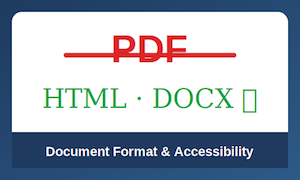Finding, Fixing and Future-Proofing your Moodle Courses
Karen Holland and Gavin Henrick are co-founders of Brickfield Education Labs. In their session, they covered how to find, fix and future-proof Moodle courses and content using the Accessibility Toolkit. They also ran through the features of the Brickfield Accessibility Toolkit, and how it can ensure that online education is accessible to all.
About the speakers
Karen is the co-founder and Chief Product Officer of Brickfield Education Labs. Karen has over 19 years of experience in software development and solution design. Karen brings a track record in UX design, developing plugins and integrations for Moodle. She is passionate about user experience design and leads the product development process at Brickfield.
Gavin is the co-founder and CEO of Brickfield Education Labs. He has 16 years of experience assisting organisations to implement a range of open-source learning solutions including the Moodle VLE/LMS. His expertise in management and education technology has aided organisations with enhancing their virtual learning environment and improving processes. He has an extensive track record working with Moodle in the corporate and academic sectors since 2007.
Brickfield Education Labs offers a comprehensive platform to improve the accessibility of Moodle course content. Brickfield Accessibility Toolkit provides accessibility auditing and remediation of course content with an improved editor and the creation of accessible file formats.
Set up in 2019, Brickfield Education Labs combines more than 50 years of experience delivering educational solutions, together with a passion for accessibility, inclusion, and good user experience.
The session recap
- Brickfield Accessibility Toolkit: Starter vs Premium Toolkit
- The problems facing institutions and students
- The solution
- Finding the challenges
- Fixing the Issues
- Future-proofing your LMS
Brickfield Accessibility Toolkit: Starter vs Premium Toolkit
Following Sander’s presentation, Gavin began this session by sharing the difference between the Starter, Premium and Enterprise versions of the Brickfield Accessibility Toolkit.
Gavin explained that the Starter Toolkit was introduced in Moodle 3.11 and will be included in 4.0 onwards. This slimmed-down version has a set of common checks, some basic reports, and the course block and heatmap. In addition, it gives an overview of the review of the course. The Starter Toolkit in Moodle 3.11 can only be rolled out course by course.
The ‘Premium’ version is the main product and is available for 3.9, 3.10 and 3.11. This version has significantly more checking on course content and advanced reporting. Content remediation tools help teachers fix common issues within the Moodle content. Interface improvements in the editor and general usage helps make the Moodle LMS more usable and accessible for all – teachers and students.
The Enterprise version has everything from Premium, and also has an automated document conversion into more accessible formats. This feature allows learners to convert files into alternate formats such as eBooks, audio files, braille format. It could also convert a PDF into a Word document or HTML, whichever the learner prefers.
The problem
After speaking to universities, institutions, non-government bodies and even training companies about accessibility, Gavin highlighted that they all seem to face a common set of challenges:
- Not all their staff are fully trained on Moodle and how to build content in Moodle.
- Some may not know HTML or accessibility standards.
- The staff are subject matter experts – not accessibility experts.
That begs the question – how can they know how and be able to create accessible content?
Secondly, Gavin commented that an institution may be unaware of how compliant they are and don’t know what needs to be fixed. Often they need to be done by hand or with accessibility or HTML knowledge.
This led to Gavin’s last statement: “People are not intentionally ignorant of accessibility and associated requirements”. As a result, Karen, Gavin and their team have created a product that will find, fix and future-proof the content in the Moodle LMS.

The solution
The Brickfield Accessibility Toolkit uses a three-step process to find, fix and future-proof content accessibility within Moodle.
- The first phase runs checks on the content within a course.
- The second phase introduces automation in automatically fixing common accessibility errors.
- Lastly, the third phase focuses on future-proofing and will incorporate features, such as alternate file formats and training for teachers and administrators.
Finding the Challenges
- Automates the analysis of the content inside Moodle against a set of WCAG standards
- Produces reports at a site level, category level and course level on the level of compliance
- Reports at a functional point of view (Moodle features) and a technical point of view (Content types)
Fixing the issues
Once the audit phase is complete, the Brickfield Accessibility Toolkit enables staff to carry out the following tasks:
- Tackle more simple issues using some automated tools
- Triage and bulk fix other items using new wizard Interfaces
Future-proofing Moodle
After the audit, reporting and remediation phases the goal is to ensure the content remains accessible. So Brickfield’s focus is on the following areas
- Building a better editor which ensures content is more accessible
- Improving other features to optimise accessibility
- Adding alternate options to facilitate not just accessibility compliance, but practicality too
- Introducing performance support work aids and nudging to support staff and learners at the point of content creation
Accessible File Solution
The Brickfield Accessibility Toolkit has an accessible file solution that integrates with Moodle. With this, learners can convert documents into more accessible formats to suit individual choices.
Amongst the alternate files available are:
- A range of text formats such as Word, TXT and HTML
- MP3 Audio files
- E-Books including Kindle and Epub formats
- Digital Braille files
If you are interested in a demo of the Brickfield Accessibility Toolkit, you can request one from the team! You can also check out our blog post ‘Every Student Deserves a First-Rate Digital Experience on the web’.


